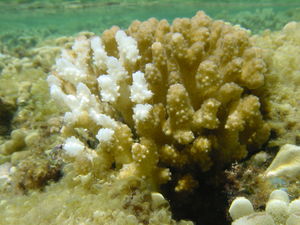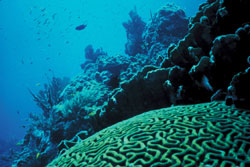A recent report predicts that by the year 2050, as much as 95 percent of the coral of Australia's Great Barrier Reef could be gone.

Over the last three decades, some 80 percent of the coral reefs of the Caribbean have died, and losses in the Pacific Ocean are widespread and severe. The main culprits are increasing levels of acidity and higher sea temperatures.
Dr. Andrew Rossiter at the University of Hawaii’s Waikiki Aquarium in Honolulu, Hawaii, USA spoke with Supreme Master Television on this tragic and alarming devastation of our marine ecosystems.
Since receiving his Ph.D. from the University of Wales, United Kingdom in 1983, Dr. Andrew Rossiter’s career has taken him to five continents.
He has published studies on the ecology, evolution and behavior of animals as diverse as the cichlid fish, freshwater insects, sturgeons, coral reef fish, birds and tortoises.
In his current work, Dr. Rossiter’s concentrates on increasing public awareness about the ecology and protection of marine life and reef habitats.
Dr. Andrew Rossiter :
We focus mainly on Hawaii and especially the marine system. But it is very, very important to realize that although we are talking about Hawaii's reefs, the impact of pollution that takes place way up stream, far away from the reefs, is also important because whatever goes into the rivers ends up in the sea.
SUPREME MASTER TV:
In Alaska, in Asia, or in the Atlantic Ocean, the pollution, does it affect the Hawaii ecosystem?
Dr. Andrew Rossiter :
Yes, the best case is perhaps the northwest Hawaiian Islands, which are a chain of islands about 1,200 miles (1900km) west of here.
They are very, very heavily affected by ship waste. They’re carried around the ocean in a circular system till they end up in the northwestern
Hawaiian Islands, where they pollute the beaches. They cause problems to the sea birds, etc.
So it’s a worldwide problem.
HOST:
The Hawaiian Islands constitutes a unique bio-region with approximately 150 distinct types of ecosystems. More than 90 percent of the islands’ flora and fauna are endemic, which are found only here and nowhere else in the world.
(http://hawaiinatureguides.net/ecosystems01.html)
Dr. Andrew Rossiter :
The Hawaii ecosystem is very, very special because the islands are so isolated.
They have been away from the mainland for millions of millions of years. The animals that come here, that have migrated here, have been isolated for millions of years and so many of them have evolved into separate forms.
Dr. Andrew Rossiter :
Around the shores of Hawaii in reasonably shallow areas, there are about 420 to 500 species of marine fish.

One third of those are found only in Hawaii, nowhere else in the world. Are they declining? That is being addressed now. There are studies ongoing, but the challenges that are faced relate to mainly the loss of the coral reef itself.
Because without a reef the animals have nowhere to live and they disappear.
SUPREME MASTER TV:
So what is causing our coral reefs to disappear? What is the primary cause?
Rossiter:
Many, many challenges are faced by coral reefs. Perhaps foremost is global warming. At the moment because the temperature is rising, corals are suffering through bleaching. Even a 1 to 2 degree rise can cause the coral to die.
HOST:
Dr. Rossiter explains what happens when corals die and go through the process known as bleaching.
Dr. Andrew Rossiter :
Coral are a live animal, but inside the animal there are living plants. Sunlight hits those small plants, those algae, they photosynthesize and they produce energy.
So there is a kind of thing where coral is feeding on sunshine. When the water temperature goes up, those algae die and so there is no energy source for the coral to feed on.
And that is called coral bleaching. What happens is the cells, the alco cells in the coral die and the coral goes white, that is the sign that it is dead.
If you go out on the reefs, you see brown, blue, brightly colored ones, those are alive. So white coral is essentially dead coral.
SUPREME MASTER TV:
So based on science in studying of the coral reefs and the environment global warming is real, it's here, and we should start taking actions to reverse the cycle of it, correct?
Dr. Andrew Rossiter :
Absolutely, absolutely, don't ignore it; it's not going to go away. Take measures now. We must be aware that it's happening and we must take extra care to preserve the reefs that we have at the moment.
The second problem is the one I referred to earlier, local pollution. So something that is thrown on the garden, up on the mountainside here, ends up in the sea, kills the reefs.
Another problem is people walking on the reefs. Coral is actually a living animal. It's not a rock. When you stand on it you cause it severe damage. Often the damage results in the death of the coral.
Another thing, the rivers, streams are carrying lots of soil because we've cut the forests. Whenever it rains, rainfall runs down the side of the mountains, into the streams, carrying soil. Soil gets carried out onto the reefs, smothers it.
So many, many effects that we can take care of.
HOST:
You are watching Planet Earth: Our Loving Home. Please stay tuned to Supreme Master Television. We’ll be right back after these brief messages with Mr. Charles Delbeek, coral reef specialist.
HOST:
This is Planet Earth: Our Loving Home on Supreme Master Television. Today’s show focuses on the danger coral reefs are facing due to climate change.
In our first segment Dr. Andrew Rossiter spoke of the factors that are damaging and even killing the Hawaiian coral reefs.
Mr. Charles Delbeek, is the well-known co-author of The Reef Aquarium: A Comprehensive Guide to the Identification and Care of Tropical Marine Invertebrates Volumes. 1 and 2 as well as many other articles and publications.
Mr. Delbeek holds two Bachelor degrees in biology and education and a Masters in zoology from the University of Toronto, Canada.
Mr. Delbeek:
I recently was participating in a workshop in the Philippines last July from The International Union for Conservation of Nature, and what we did was, with marine and coral specialists from around the world, we looked at all 750 species of corals and evaluated their risk for extinction over the next 20 to 30 years, and there’ll be a handful of corals on there that will be critically listed as being endangered.
One of the main reasons is global warming.
SUPREME MASTER TV:
So, to sum things up, if our ocean temperature rises certain degrees, it will cause a possible impact on the coral reefs being bleached?
Mr. Delbeek:
Definitely, and there’s El Niño effects which are becoming more frequent over the last few decades, and these are basically large bodies of warm water that then move across the Pacific or the Indian Ocean, and if they sit over the coral reef area for more than several weeks or months, the corals will die.
Mr. Delbeek:
It’s not just the increase in temperature that’s the problem, it’s how long it stays at that temperature that’s the real problem.
If the temperature remains high for several weeks or months, it’s a real problem.
Annual Mean Temperature Change for Land and Ocean
Annual and five-year running mean temperature changes for the land (green) and ocean (purple)
(Image Credit - NASA.gov )
If it’s just for a couple of weeks, then normally the corals can survive that. Even if the corals do bleach, the animal itself hasn’t died, it’s still there, and if the temperatures come back down to normal, there’s a good chance those reefs will recover.
Mr. Delbeek:
They can withstand bleaching, they can recover over time, it takes decades, but it can happen.
So there are success stories where reefs have come back, but that’s just one of the pieces of the puzzle. I mean there’s human impacts which can also affect the reef’s ability to recover so in areas where the reefs are still in good shape, they get bleached, they can recover, but reefs that are impacted negatively by human impacts will be much more difficult for them to recover.
SUPREME MASTER TV:
Is it true that there’s several of the Marshall islands in the Pacific Ocean that are completely surrounded by coral reef and when tsunamis or typhoons hit, the impact is reduced because of the coral reef?
Mr. Delbeek:
Yes, without a coral reef present, something like a tsunami would basically wipe out that entire country, put it under water.
These island nations like the Marshall Islands; they’re basically coral atolls and they are only about a meter above sea level; even with the coral reef there, a tsunami would wreak quite a bit of damage.
What the reef does is it acts like a buffer, it actually slows down that tsunami, it takes the brunt of the damage.
Mr. Delbeek:
I think that the major impacts are going to be on land erosion with loss of reefs, loss of species diversity.
A lot of these island nations depend on these reefs. Their beaches are directly the results of the actions of animals on coral reefs, and the coral reefs protect those beaches from erosion and without the coral reefs, all those things are going to disappear.
HOST:
Mr. Delbeek offers his advice for protecting our precious coral reefs to ensure the survival of our planet’s human and animal inhabitants.
Mr. Delbeek:
You have to educate people about the reefs, about the resources they have and educate them about what the impacts can be if they’re not used properly and teach them how to become stewards of their own resources.
HOST:
Home to more than twenty-five percent of all marine species, coral reefs are early indicators of the impact of climate change and human activities.
The only real hope for corals in the long term is a quick, sustained reduction in our excessive greenhouse gas emissions, namely through the adoption of a plant-based diet.



